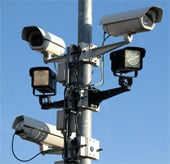 At some stage the majority of content created by the world’s leading movie and TV companies enters the digital realm. Whether during production, post-production, marketing or distribution, the digitization of video is the inevitable outcome of technological advances.
At some stage the majority of content created by the world’s leading movie and TV companies enters the digital realm. Whether during production, post-production, marketing or distribution, the digitization of video is the inevitable outcome of technological advances.
As a result, dozens of companies are involved in shifting studio content around the world, either as part of the creative process or when finished material is made available to the public via platforms such as Netflix or Amazon.
Of course, every company that gets involved represents an additional weak link in the chain, with the potential for movies to be pirated before they’re ready for distribution (workprints, for example) or once they’re completed. Unsurprisingly, the MPAA works extremely hard to ensure that such leaks are kept to a minimum.
Nowhere is that more evident than in the documentation that accompanies the MPAA’s Content Security Model, a set of best practices aimed at companies entrusted with handling protected media and content. Amazon, one of the MPAA’s partners, has published the Hollywood group’s latest set of requirements.
Admittedly many of the MPAA’s demands will be already-established business practices for a big company like Amazon, but a few really stand out as examples of how far Hollywood is prepared to reach into its suppliers’ operations.
For example, in addition to carrying out background screening on all employees and third party contractors, the MPAA demands that all workers sign annual confidentiality agreements that forbid them from talking about protected content.
With an eye on local law, companies must also implement random searches of their workers for traces of MPAA content, including the removal of coats, hats and belts, the emptying of pockets, a full security pat-down, scanning with metal detectors and inspection of electronic devices.
Workers are also forbidden from entering/exiting premises with any digital recording devices such as USB drives, cameras and cellphones, while anyone bringing food into a production area must do so using a transparent bag or container.
And to ensure that no one tries to smuggle content out, companies such as Amazon are required to implement a worker dress code which bans the use of “oversized clothing” such as baggy pants or hooded sweatshirts.
Overseeing all of these precautions are any number of security guards, but not even they escape the eyes of the MPAA. Studio partners are also required to implement additional controls to ensure that their own security guards are “actively” monitored.
For workers with computer access there are dozens of rules and regulations (most making complete sense from an IT security perspective), but those thinking of smuggling out a file or two should perhaps reconsider. The MPAA insists that all movement of content, both internally and externally, should be subject to comprehensive logging, including username, timestamps, filenames, plus source and destination IP addresses.
The above represent just a few examples of the MPAA’s comprehensive requirements but no matter how stringent the rules, content leaks happen each and every year.
Whether that’s the handful of movie workprints that periodically make the headlines or the dozens of fully finished Oscar screeners hitting the web annually, leaks are here to stay – at least for the foreseeable future.





